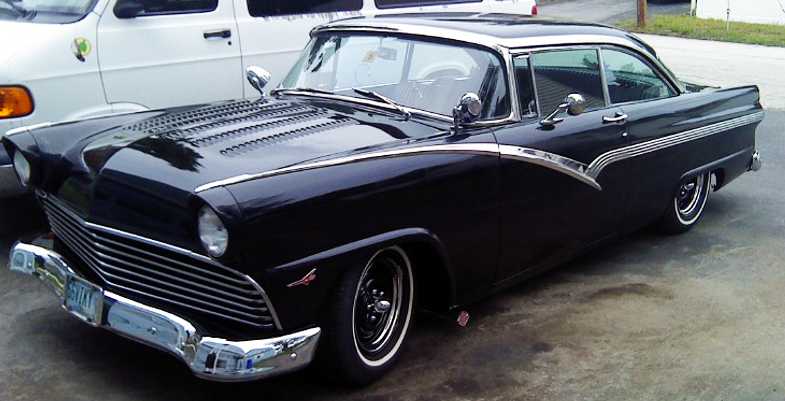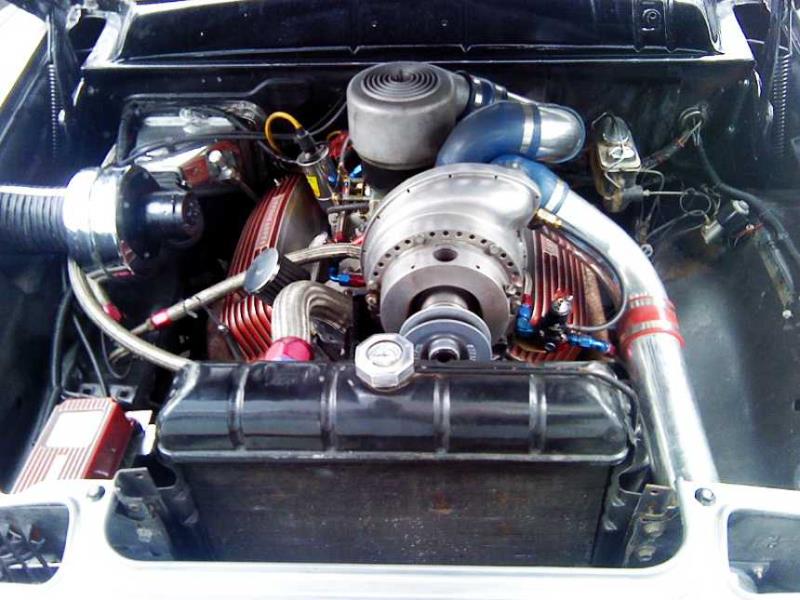|
Author
|
Message
|
|
ian57tbird
|
|
|
Group: Forum Members
Last Active: 2 days ago
Posts: 498,
Visits: 21.7K
|
I had read that like oil, dot 5 is lighter and any water will go to the lowest points, being the slave cylinders, and could boil under extreme conditions and affect braking. It doesn't sound like you have had any problems though. Maybe it would only be an issue if it was introduced into the system as it doesn't attract it like the others.
On a different note, I draw the fluid out of my master cylinder before flushing the brakes so as to try not to push more contaminants through the system.
|
|
|
|
|
Ted
|
|
|
Group: Administrators
Last Active: Yesterday
Posts: 7.5K,
Visits: 205.8K
|
ian57tbird (10/5/2013)
What do you mean by collapsed rear brake line?Over the years I’ve had several brake hoses that collapsed internally. They all did the same thing in that when the brakes were applied, pressure to the linings did not release when the brake pedal was released. In most instances, it’s always been the front hoses which are more prone to breaking up internally simply due to the extra flexing that takes place on those hoses due to the steering action. If I had to put a time frame on replacing brake hoses, I’d say do it mandatorily every fifteen years but I did have a ’62 Thunderbird that had a hose failure at the twelve year mark. . As far as brake fluid goes, I’ve been running Dot 5 fluid in all the race cars and some of older driver cars for well over twenty five years. Dot 5 fluid is non-hyrdroscopic and that has eliminated the moisture absorption problems related to the Dot 3 and Dot 4 fluids. My ’55 Customline managed to get 20+ years on the Dot 5 fluid without issues before I had to go back into the system to replace linings and check out the wheel cylinders. It was nice to go into those wheel cylinders and not see any of the prerequisite ‘mud’ that is associated with getting moisture into the system.
  Lorena, Texas (South of Waco) Lorena, Texas (South of Waco)
|
|
|
|
|
56_Fairlane
|
|
|
Group: Forum Members
Last Active: 9 Months Ago
Posts: 575,
Visits: 14.6K
|
It seemed it didn't take long for the brake fluid to turn black in the Mercedes Benzes I used to own. It's possible it was just years of neglect that caused it to accumulate and the new fluid acted as a solvent. There have been changes to the fluid chemistry over the years, such as DOT 1, 2, 3, etc that may not be as friendly to the composition of the old rubber components in the brake system. The fluid is supposedly compatible but I have my doubts.
~DJ~ AKA "Bleach"
1956 Ford Fairlane Town Sedan 30K original miles
|
|
|
|
|
MoonShadow
|
|
|
Group: Forum Members
Last Active: Yesterday
Posts: 4.6K,
Visits: 38.4K
|
You know I've always had a laugh when I see garages with a "special" on flushing brake systems. I only add as needed after doing brake work. Another new trick for the old dog I guess. Makes sense though. Chuck
Y's guys rule!
Looking for McCullouch VS57 brackets and parts. Also looking for 28 Chrysler series 72 parts. And early Hemi parts.
 
MoonShadow, 292 w/McCulloch, 28 Chrysler Roadster, 354 Hemi)
Manchester, New Hampshire
|
|
|
|
|
ian57tbird
|
|
|
Group: Forum Members
Last Active: 2 days ago
Posts: 498,
Visits: 21.7K
|
I flush out the brake fluid on my cars about every 2 years as it is hydroscopic and the water in the system is the main reason for components failing, but I did not know it affected the rubber hoses.
|
|
|
|
|
The Master Cylinder
|
|
|
Group: Forum Members
Last Active: 4 Years Ago
Posts: 974,
Visits: 6.2K
|
|
|
|
|
|
56_Fairlane
|
|
|
Group: Forum Members
Last Active: 9 Months Ago
Posts: 575,
Visits: 14.6K
|
MoonShadow (10/5/2013)
I was driving to Boston one time with my 85 Mercedes 300D. It started loosing power. I thought the diesel lines were getting clogged again. Eventually it wouldn't go over 40MPH. Got to my appointment and started back everything was fine for about 20 miles and then it started slowing again. Turned out I had a frozen brake caliper on the right rear. It got so hot it melted the dogbone that attaches the sway bar. What a stinky mess. ChuckIt's actually on common problem with them. It happens when the brake system gets moisture and when the car sits for some time. The maintenance manual recommends changing the fluid every two years or 24K miles if I recall correctly. I've had three of these cars over the years.
~DJ~ AKA "Bleach"
1956 Ford Fairlane Town Sedan 30K original miles
|
|
|
|
|
ian57tbird
|
|
|
Group: Forum Members
Last Active: 2 days ago
Posts: 498,
Visits: 21.7K
|
I had a car about 30 years ago that a front calliper kept locking on and I never knew the cause. It sounds like I finally found the answer.
|
|
|
|
|
MoonShadow
|
|
|
Group: Forum Members
Last Active: Yesterday
Posts: 4.6K,
Visits: 38.4K
|
I was driving to Boston one time with my 85 Mercedes 300D. It started loosing power. I thought the diesel lines were getting clogged again. Eventually it wouldn't go over 40MPH. Got to my appointment and started back everything was fine for about 20 miles and then it started slowing again. Turned out I had a frozen brake caliper on the right rear. It got so hot it melted the dogbone that attaches the sway bar. What a stinky mess. Chuck
Y's guys rule!
Looking for McCullouch VS57 brackets and parts. Also looking for 28 Chrysler series 72 parts. And early Hemi parts.
 
MoonShadow, 292 w/McCulloch, 28 Chrysler Roadster, 354 Hemi)
Manchester, New Hampshire
|
|
|
|
|
Doug T
|
|
|
Group: Forum Members
Last Active: 3 Months Ago
Posts: 563,
Visits: 2.6K
|
Re hoses, I had an Escort one time that had a steel flat bar bracket that was wrapped around the brake hose, it was factory stock. It rusted inside the bracket and built up the classic layers of rust gradually choking off the hose so that it acted as a one way check valve. The line pressure was enough to spring the bracket open but the brake fluid could not return and so held the pads on the disc. It took a long time to find that. I don't think Y block vintage Fords have such a bracket.
Doug TThe Highlands, Louisville, Ky. 
|
|
|
|